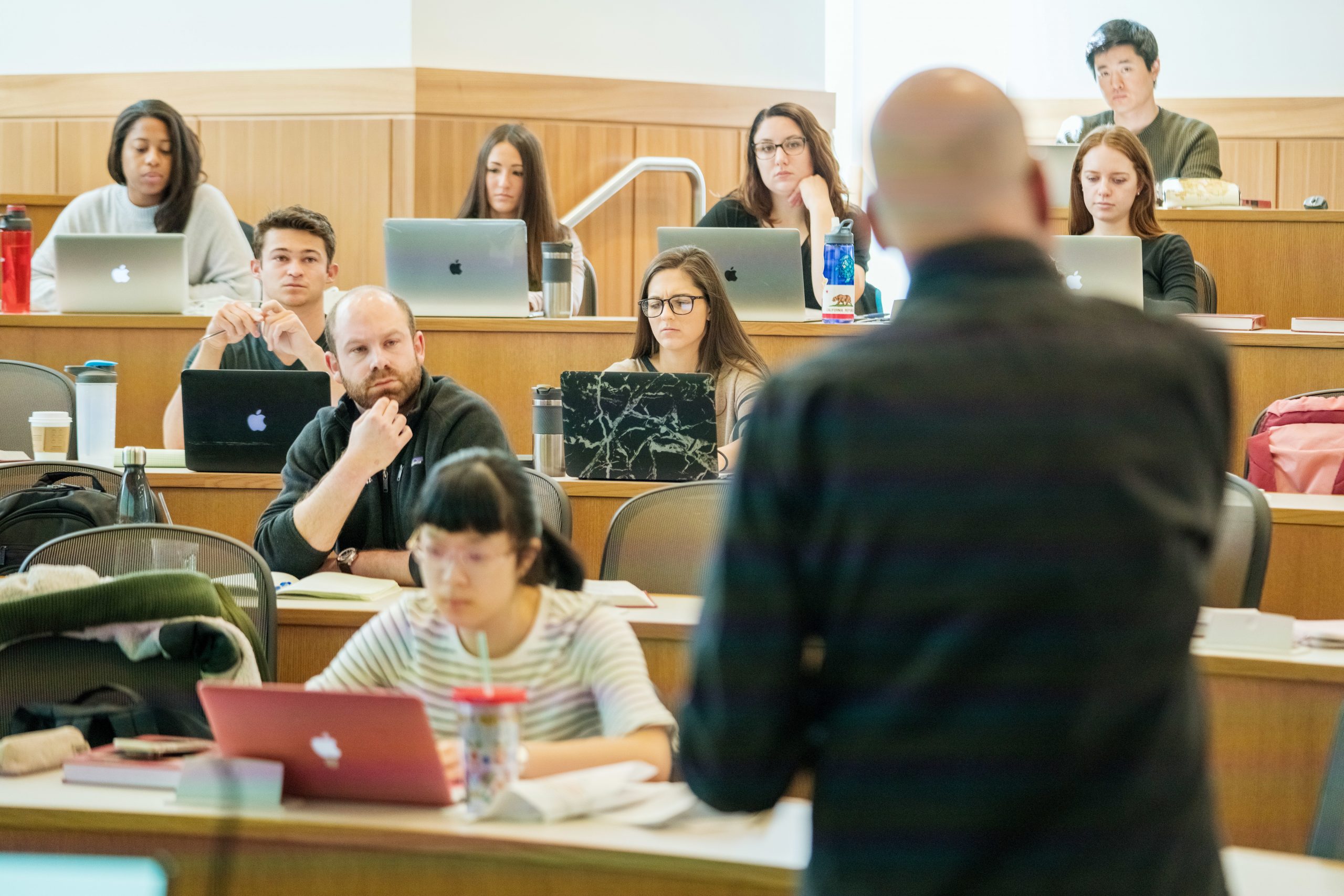Recognizing Excellence in Faculty
Kevin Outterson and Jack Beermann were recently named the Austin B. Fletcher Professor of Law and the Philip S. Beck Professor of Law, respectively.

Recognizing Excellence in Faculty
Kevin Outterson and Jack Beermann were recently named the Austin B. Fletcher Professor of Law and the Philip S. Beck Professor of Law, respectively.
When Boston University School of Law Professor Kevin Outterson was named the Austin B. Fletcher Professor of Law last fall in recognition of his research, teaching, and scholarship, he assumed a title that dates back nearly a century.
Fletcher, an 1880 graduate of BU Law who later taught oratory at the school, established the professorship shortly before his death in 1923, creating it with several pieces of property he owned in New York City. The Fletcher professorship was the first named chair in BU Law’s history, and for decades, it was the only one.
Even today, there are only a handful of named professorships at the school of law available to award to faculty for their accomplishments and support their scholarship or to recruit talented new scholars to teach. But Dean Angela Onwuachi-Willig and her team hope to change that.
“One of the priorities in Boston University’s Strategic Plan is ‘research that matters,’” Onwuachi-Willig explains. “In order to produce research that matters, we need financial resources like endowed professorships to support that work.”
Zach Dubin, assistant dean for development and alumni relations, agrees, adding that named professorships are a way to acknowledge the expertise and impact of BU Law faculty.
“We are trying to shout a bit louder from the rooftops about how amazing some of our programs are,” he says. “These chairs allow the school to demonstrate our continued leadership in specific spaces and sectors and to attract the very best talent in those areas and reward and acknowledge them properly.”
These chairs allow the school to demonstrate our continued leadership in specific spaces and sectors and to attract the very best talent in those areas and reward and acknowledge them properly.
Onwuachi-Willig received the newest named professorship in 2021, when Ryan Roth Gallo (’99), a Boston University trustee, and her husband created the Ryan Roth Gallo and Ernest J. Gallo Professorship in critical race theory—the only professorship in the subject in the country. Last year, in addition to Outterson’s designation as the Austin B. Fletcher Professor of Law, Professor Jack M. Beermann was named the Philip S. Beck Professor of Law, a chair created by Beck, a 1976 graduate, in 2005. The other named professorships at BU Law are the Robert Kent chair, which Linda C. McClain holds; the Honorable Paul J. Liacos Professorship, held by James E. Fleming; and the William and Patricia Kleh Visiting Professorship in International Law, currently held by Zachary Kaufman. There are also several named scholar positions at BU Law.
BU Law faculty have been honored with University-wide named chairs as well. Keith N. Hylton, Gary S. Lawson, and George Annas (who teaches at the law school and the School of Public Health), hold William Fairfield Warren Distinguished Professorships, which are awarded by the University’s president. Wendy J. Gordon is a Warren Emeritus Professor. And Ngozi Okidegbe holds a Moorman-Simon Career Development Professorship from the provost’s office.
For many years, Outterson codirected the top-ranked Health Law Program, and he now serves as executive director of CARB-X, a global nonprofit that supports the development of new antibiotics, vaccines, and rapid diagnostics to address the urgent health threat of drug-resistant bacteria. He says he was “thrilled” to receive the news of his professorship from Onwuachi-Willig in the fall.
“It’s an honor at this point in my career to receive this recognition from my colleagues and the University,” he says.
Outterson says the financial resources that accompany named professorships are critical. He points out that he started researching antibiotics with a $20,000 grant from a BU Law alum; today, this work has blossomed into CARB-X, which has 27 employees and more than $800 million in funding has been committed from governments and foundations, with more on the way. Outterson’s work also has led to the development of so-called “pull” incentives, which guarantee government payments for successful antibiotics and which the Center for Global Development reported recently would save 9.9 million lives over the next three decades.
Beermann’s scholarship focuses on civil rights litigation and administrative law. In 2021, the University Press of Kansas published Beermann’s book, The Journey to Separate But Equal: Madame Decuir’s Quest for Racial Justice in the Reconstruction Era, which examines the story behind a case that helped cement Jim Crow laws in the South. Beermann is also coauthor on a widely used casebook on administrative law (with two former BU Law Deans, Ronald A. Cass and Colin S. Diver) and has published on subjects as varied as public pension reform, the reach of Reconstruction-era civil rights statutes, midnight regulation, and presidential transitions more generally. He serves as an appointed public member of the Administrative Conference of the United States, a federal government agency.
“It’s a nice feeling to know that your work is appreciated by the administration and your colleagues,” he says.
Increasing funds for named professorships is a major goal for Onwuachi-Willig.
“For its entire history, the law school has been well known for the high quality of its faculty, not just as scholars but as teachers,” Dubin says. “As we move into the future, our faculty will be front and center of our efforts.”
That’s fitting since faculty are so often the highlight of a student’s experience on campus.
“There is not an alum whom I’ve talked to who doesn’t mention the importance of teaching and mentoring at BU Law,” Onwuachi-Willig says. “There’s an enormous connection between excellent research and teaching. Endowed chairs and professorships allow us to continue to attract the kinds of top-notch faculty who will ensure that generations of students have the same transformational educational experience.”
